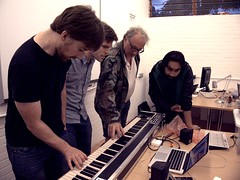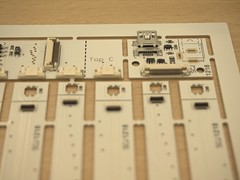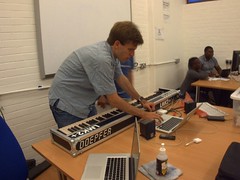Not Just Arduino Event 21
Not Just Arduino 12th August
Presentations
Demo of TouchKeys, a DIY touch sensor kit for keyboards currently on Kickstarter by Andrew McPherson.



Events
A weekend-long technology festival set in the heart of the Pennines. St. George's Street, Hebden Bridge, HX7 7BY
7-8th Sept - Corn Exchange Brighton
- Hack the barbican Arts+Technoology+Entrepeneurship, 5th–31st August. Lots of events, including hackathons, concerts, workshops. Free or cheap entrance.
- Campus Party
2-7 Sept. Ticket £15 for a day pass. An annual week-long, 24 hour a day technology festival and LAN Party. Thousands of hackers, developers, gamers and geeks equipped with laptops camp out in tents on-site for the conference and hackathon.
Hackspace Open Day
On 18th August we'll have our second Hackspace Open Day from 1pm till late. Some of the NJA members will bring Arduino robots and quadcopters. Can you bring a project to demo? Can you organise a small workshop? We'll also have:
- Amateur Radio Demonstration
- Restart Party
- A BBQ in the yard
- Some music Hackspace devices
- The amazing LHS Bikeshed spaceship-simulator-in-a-caravan?
- Possibly some Liquid nitrogen ice cream and demos
Add your ideas here or reply on mailing list thread.
NJA Community
- Join us on Github: Not Just Arduino to centralise documentation about all NJA projects. For some reason on GitHub all users can't request to join a group but have to be added by a owner, so please send us your username! Then you'll be able to add your repos and code! Tell us if you need help.
- Lear how to use this wiki! If you need help ask Marc. Documentation is available here.
- Document your project! Here is a good example
- Follow us on twitter
- Join the Flickr group
- And don't forget our mailing list: Not Just Arduino
Interesting projects
The goal is to arrive at a better understanding of who we are as a community, why and how we use/make open-source hardware, and how our practices and numbers are changing over time.
ArduSat is an open source, Arduino based Nanosatellite, based on the CubeSat standard. It contains a set of Arduino boards and sensors. The general public will be allowed to use these Arduinos and sensors for their own creative purposes while they are in space. Here is the Kickstarter page. The cargo ship carrying the CubeSats should arrive at the ISS on 9 August, and the satellites will then be deployed using a robotic-arm technique. The method can put several small satellites into orbit around Earth, eliminating the need for dedicated launch vehicles and making citizen-science missions like ArduSat more affordable. List of ideas from the developers includes tracking meteorites and making a 3D model of Earth's magnetosphere. The 10-centimetre cube-shaped satellites weigh approximately one kilogram and are powered by solar panels and rechargeable batteries. Inside are a number of instruments, including cameras, temperature sensors, CO2 and ozone sensors, and a Geiger counter.
Strange or crazy projects
By the creator of the equally over-engineered Discreet Pants Fly Checker.
Some people call it the “Etsy for hardware”, some other “the indie marketplace for open source hardware”, even if being open is not a requirement. Tindie’s mission consists of connecting the world’s small, hardware businesses with customers all over the world and today starts a cool initiative called Open Designs and Kickbacks. When sellers create a new product, they will be able to select a project the product is a derivative from, and enter the % of sales that will go to the open hardware project. More info: http://blog.tindie.com/tindie-launches-open-designs-and-kickbacks.html
The build uses an Arduino to detect knocks on any flat surface, and toggle power to the two outlets on the box.
More links: Leap Motion , Example 1, Example 2.
RaspberryPi
The LightwaveRF system offers a WiFi link which provides Internet connectivity for all of those devices in your house. This makes it a snap for [Chipos81] to control them from the RPi. To provide speech recognition he’s using CMU Sphinx. It’s an open source speech recognition library developed by researchers at Carnegie Mellon University and released under a BSD license. Voice controlled developed in Edinburgh by Festival: http://www.cstr.ed.ac.uk/projects/festival/ http://cmusphinx.sourceforge.net/
Using Android, along with Tasker and NFC to automate many of the things in his home, including lights, door locks, home theater components, thermostat controls, and even his popcorn machine.
Minecraft Pi uses an application programmer interface (API for short) that allows programmers to interact with a Minecraft game world. Students can combine the API into their own Python programs to do things like place blocks, teleport the player or access hidden features like chat. For example they can create a castle with code in a few seconds, instead of building it by hand (which takes ages). Using Minecraft Pi to help students learn programming has the potential to be very engaging and effective. Links: Learning Python using Codecademy and Raspberry Pi Minecraft and on Rpi's blog
Tutorial
10 video tutorials featuring Massimo Banzi showing how to create cool projects with the redesigned release of the Kit and all its components, now release in creative commons.
Martin Lorton’s video blog is a great jumpstart to learning electronics, from Arduino basics to SMD tutorials.
The creators behind this hugely successful crowd-funding campaign have published electronics tutorials. More info: http://www.indiegogo.com/projects/9-arduino-compatible-starter-kit-anyone-can-learn-electronics
Comments
Next event will be hosted by Paul and Steve (thanks guys!).
Next event
Hope to see you all on Monday 26th August 7PM